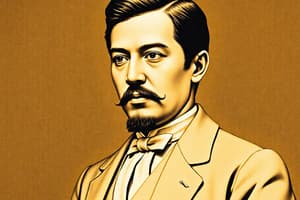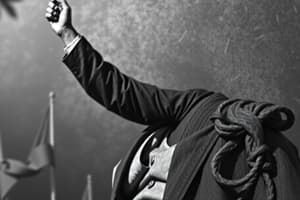Podcast
Questions and Answers
Who is considered the first exponent of Asian nationalism?
Who is considered the first exponent of Asian nationalism?
Jose Rizal
Rizal Law was welcomed by various quarters including the Catholic Church.
Rizal Law was welcomed by various quarters including the Catholic Church.
False (B)
What does the Rizal Law, Republic Act No. 1425, require schools to include in their curricula?
What does the Rizal Law, Republic Act No. 1425, require schools to include in their curricula?
- Courses on American history
- Courses on Spanish literature
- Courses on the life of Jose Rizal (correct)
- Courses on modern science
When was the Rizal Law signed into effect?
When was the Rizal Law signed into effect?
Who authored the original Rizal Bill?
Who authored the original Rizal Bill?
The novels _______ and _______ are specified in the Rizal Law.
The novels _______ and _______ are specified in the Rizal Law.
Which agreement ensured free entry of American products into the Philippines?
Which agreement ensured free entry of American products into the Philippines?
What is the primary aim of the Rizal Law?
What is the primary aim of the Rizal Law?
Which notable person expressed opposition to the Rizal Bill?
Which notable person expressed opposition to the Rizal Bill?
Who is considered to be the first exponent of Asian nationalism?
Who is considered to be the first exponent of Asian nationalism?
What is Republic Act No. 1425 also known as?
What is Republic Act No. 1425 also known as?
Who was the original author of the Rizal Law?
Who was the original author of the Rizal Law?
The Catholic Church welcomed the Rizal Law.
The Catholic Church welcomed the Rizal Law.
What did Fr. Jesus Cavanna criticize about Rizal's novels?
What did Fr. Jesus Cavanna criticize about Rizal's novels?
Which of the following was NOT an opponent of the Rizal Law?
Which of the following was NOT an opponent of the Rizal Law?
When did the Rizal Law come into effect?
When did the Rizal Law come into effect?
The Rizal Law mandates the inclusion of works like Noli Me Tangere and El Filibusterismo in the ______ curriculum.
The Rizal Law mandates the inclusion of works like Noli Me Tangere and El Filibusterismo in the ______ curriculum.
What was one of the key objectives of the Rizal Law?
What was one of the key objectives of the Rizal Law?
Flashcards are hidden until you start studying
Study Notes
Learning Outcomes
- Understand the practical application of law in everyday situations.
- Recognize the challenging legislative process involved in law creation.
- Explore the qualities that justify Jose Rizal's status as a National Hero.
Jose Rizal's Significance
- Rizal viewed as the first proponent of Asian nationalism, predating leaders like Dr. Sun Yat-sen and Mohandas K. Gandhi.
- His life embodies the spirit of the first successful Asian revolution against Western colonialism.
Rizal Law (Republic Act No. 1425)
- Authored by Claro M. Recto, aimed at instilling heroism among Filipino youth.
- Requires inclusion of courses on Rizal's life, works, and writings (Noli Me Tangere and El Filibusterismo) in all educational institutions.
- The original editions or English translations of these novels must be used as basic texts.
- Exemptions allowed for students based on religious beliefs through a sworn written statement.
Legislative Background
- The law faced significant opposition, particularly from the Catholic Church, due to perceived anti-church sentiments in Rizal's novels.
- Notable opponents included Fr. Jesus Cavanna and Jesus Paredes, who criticized the novels and called for refusal to read them.
- Senator Francisco Rodrigo and Congressman Miguel Cuenco were prominent voices against the bill in Congress.
- After contentious debates, a compromise bill was formed by Senator Jose P. Laurel, leading to the law's implementation on June 12, 1956.
Implementation Details
- Signed into law by President Ramon Magsaysay.
- Aimed to make the Rizal course a mandatory graduation requirement for all tertiary education programs.
- In 1994, President Fidel Ramos ordered full implementation of the Rizal Law, reaffirming its relevance.
- CHED Memorandum Order 6 issued in February 1996 mandated all colleges and universities to offer the Rizal course as a separate three-unit subject.
Objectives of the Rizal Law
- To highlight the relevance of Rizal's ideas and teachings to contemporary issues and to apply them in modern contexts.
- To foster appreciation of Rizal's character and values, promoting personal discipline and moral development.
- To cultivate civic conscience and an understanding of citizenship duties among students.
Definition of a Hero
- The concept of heroism is framed by Rizal’s qualities and contributions, which are studied to inspire personal growth and national pride.
Learning Outcomes
- Understand the practical application of law in everyday situations.
- Recognize the challenging legislative process involved in law creation.
- Explore the qualities that justify Jose Rizal's status as a National Hero.
Jose Rizal's Significance
- Rizal viewed as the first proponent of Asian nationalism, predating leaders like Dr. Sun Yat-sen and Mohandas K. Gandhi.
- His life embodies the spirit of the first successful Asian revolution against Western colonialism.
Rizal Law (Republic Act No. 1425)
- Authored by Claro M. Recto, aimed at instilling heroism among Filipino youth.
- Requires inclusion of courses on Rizal's life, works, and writings (Noli Me Tangere and El Filibusterismo) in all educational institutions.
- The original editions or English translations of these novels must be used as basic texts.
- Exemptions allowed for students based on religious beliefs through a sworn written statement.
Legislative Background
- The law faced significant opposition, particularly from the Catholic Church, due to perceived anti-church sentiments in Rizal's novels.
- Notable opponents included Fr. Jesus Cavanna and Jesus Paredes, who criticized the novels and called for refusal to read them.
- Senator Francisco Rodrigo and Congressman Miguel Cuenco were prominent voices against the bill in Congress.
- After contentious debates, a compromise bill was formed by Senator Jose P. Laurel, leading to the law's implementation on June 12, 1956.
Implementation Details
- Signed into law by President Ramon Magsaysay.
- Aimed to make the Rizal course a mandatory graduation requirement for all tertiary education programs.
- In 1994, President Fidel Ramos ordered full implementation of the Rizal Law, reaffirming its relevance.
- CHED Memorandum Order 6 issued in February 1996 mandated all colleges and universities to offer the Rizal course as a separate three-unit subject.
Objectives of the Rizal Law
- To highlight the relevance of Rizal's ideas and teachings to contemporary issues and to apply them in modern contexts.
- To foster appreciation of Rizal's character and values, promoting personal discipline and moral development.
- To cultivate civic conscience and an understanding of citizenship duties among students.
Definition of a Hero
- The concept of heroism is framed by Rizal’s qualities and contributions, which are studied to inspire personal growth and national pride.
Studying That Suits You
Use AI to generate personalized quizzes and flashcards to suit your learning preferences.




